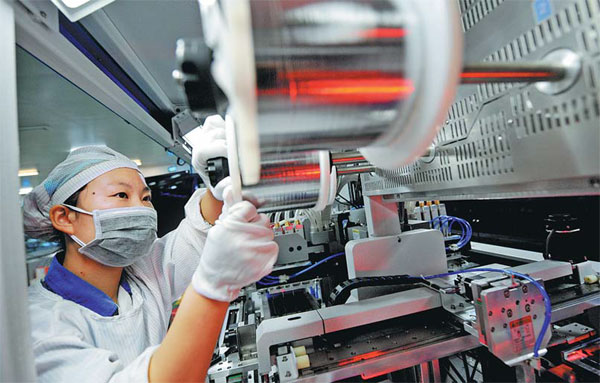Setting the stage for sustainable development
Province striking balance between GDP growth and ecological protection
Jiangxi province in East China has developed a green economy, controlled water pollution, especially in its rivers, and constructed ecological systems to improve the local environment.
Its efforts are very much in keeping with the precepts of sustainable growth and ecological development that is discussed at the ongoing G20 Summit in Hangzhou.
|
A staff member at New York listed Jinko Silicon, which is based in Shangrao, Jiangxi province. The province has strengthened efforts to develop the high-tech sector in a bid to better preserve its ecology and environment. Zhuo Zhongwei / For China Daily |
The province has witnessed stable economic growth in the first six months of this year, with GDP growing 9.1 percent year-on-year, according to the provincial statistics bureau. Its total GDP was more than 782 billion yuan ($117 billion), the bureau said.
Jiangxi's GDP growth was above the national average level, which stood at 6.7 percent in the first half of this year.
The province's stable economic growth is in line with the precepts of environment governance and ecological protection.
Jiangxi's ecological environment has also been rated highly, and the forest coverage in the province remains above 60 percent.
The local government aims to make Jiangxi a model for other provinces in ecological protection and overall development. "The key is to establish ecological systems that benefit society," said Lu Xinshe, Party chief of Jiangxi.
To this end, the government has invested heavily in water resources protection, and worked to create a business environment where the green economy can flourish, and its efforts are showing signs of success.
Lai Guogen, vice-mayor of Yichun, said the city used natural methods to ensure the cleanliness of the water in its 1,830 reservoirs: a range of fish species capable of keeping the reservoir clean were added and allowed to develop naturally.
"We cannot wait until the water becomes polluted before we take action," Lai said.
In Nanchang, the provincial capital, the government has prioritized the restoration of the ecological system of rivers, lakes and wetlands.
More than one-third of the capital's area is covered by rives and lakes, and the government has invested around 20 billion yuan to improve the environment around its rivers and lakes, and build artificial wetland systems to help restore the lakes' ability to self-purify.
A wetland park was established around the lake, making it an ideal environment for birds and a magnet for tourists.
The government's investment in sustainable ecosystems has helped the province maintain its steady economic growth, and the province has also become a hot spot for foreign direct investment.
In the first half of this year, more than 330 overseas businesses decided to invest in Jiangxi, with total contract value of $4.16 billion, up 13.6 percent from the same period last year, the statistics bureau said.
The province's actual utilized foreign direct investment was $5.7 billion, rising 11.5 percent year-on-year, and it has grown for six consecutive months.
More than $3.8 billion of FDI went into the manufacturing industry with contractual value of $2.94 billion.
The communication equipment and electronics manufacturing industries also saw significant funds.
The growth of industrial added value in the first six months of this year also increased 9 percent to 328.1 billion yuan, according to the statistics bureau said.
In addition, the government has encouraged enterprises and businesses to develop a green economy, which includes developing the tourism sector, and activities such as planting cost-effective crops and building photovoltaic power plants.
Green development
Wanli district in Nanchang, near Poyang Lake, one of the key lakes in the province, has a history of environmental pollution due to the local focus on animal husbandry.
With more than 600 pig farms covering the district, the lake became polluted and forest areas were decimated. In 2009, the government began encouraging local people to protect the lake and forests and it began developing the eco-tourism sector.
The pig farms have now been replaced by new forested areas, and the coverage rate now stands at 73 percent. More than 3 million tourists visited Wanli in the first six months of this year, bringing in around 1.1 billion yuan.
Locals living close to Poyang Lake have found other ways besides the tourism industry to improve their livelihood thanks to the country's green initiatives.
The growing number of visitors has led to the increasing popularity of local specialized products, such as gorgon fruit, which comes from an aquatic plant.
The fruit is said to have anti-inflammatory properties but it requires abundant clean water in order to thrive.
Thanks to local government measures, the fruit is being extensively cultivated in the county of Yugan.
"The income from one planting of gorgon fruit can double that from two plantings of rice," said Liu Shanyu, an official with the Yugan local government.
"The county began to expand the planting of gorgon fruit in 2014, and this year the planting area will hit 13,333 hectares. Some investors have injected 500 million yuan to build an industry garden," he said.
In the first half of this year, Jiangxi's foreign trade improved despite the sluggish global economy. The total import and export value was 138 billion yuan, almost equaling last year's figure, according to the provincial statistics bureau.
The export value was 107 billion yuan, falling 4.2 percent year-on-year, but the decline was less severe in the second quarter.
Exports to the United States, one of the province's major trade destinations, increased 7.2 percent year-on-year.
renjie@chinadaily.com.cn

























